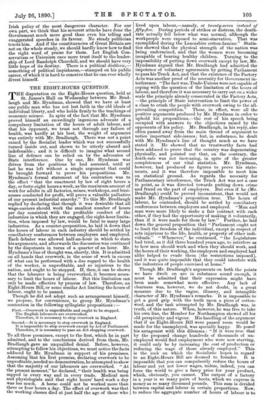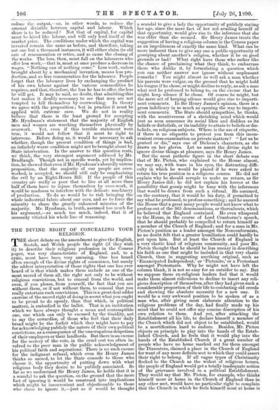THE EIGHT-HOURS QUESTION. T HE disputation on the Eight-Hours question, held
at St. James's Hall on Wednesday between Mr. Brad- laugh and Mr. Hyndman, showed that we have at least one public man who has not lost faith in the old ideals of individual liberty, and who holds firmly to the teachings of economic science. In spite of the fact that Mr. Hyndman proved himself an exceedingly ingenious advocate of a compulsory limitation of the hours of adult labour, and that his opponent, we trust not through any failure of health, was hardly at his best, the weight of argument was entirely with Mr. Bradlaugh. There was not a point raised by the Socialist leader which was not successfully turned inside out, and shown to be utterly absurd and indefensible ; and it is difficult to imagine what second line of defence can be relied on by the advocates of State interference. One by one, Mr. Hyndman was driven from the positions he had assumed, until at last he was left without a single argument that could be brought forward to prove his propositions. Mr. Hyndman's formal statement of his contention was to the effect " that the enactment by law of eight hours a day, or forty-eight hours a week, as the maximum amount of work for adults in all factories, mines, workshops, and busi- nesses conducted for profit, will prove a valuable palliative of our present industrial anarchy." To this Mr. Bradlaugh replied by declaring that though it was desirable that all wage-earners should work the smallest number of hours per day consistent with the profitable conduct of the industries in which they are engaged, the eight-hour limita- tion, when imposed by law, would be fatal to many large industries. As a counter-proposition, he laid it down that the hours of labour in each industry should be settled by conciliatory conferences between employers and employed. Each debater was allowed half-an-hour in which to state his arguments, and afterwards the discussion was continued by the disputants in turns of a quarter of an hour. Mr. Hyndman's line of thought was, shortly, this. It is admitted on all hands that overwork, in the sense of work in excess of what can be performed with a due regard to the health of the worker, is unprofitable, and so injurious to the nation, and ought to be stopped. If, then, it can be shown that the labourer is being overworked, it becomes neces- sary to limit the hours of labour. But this limitation can only be made effective by process of law. Therefore, an Eight-Hours Bill, or some similar Act limiting the hours of labour, ought to be passed.
Though he did not adopt such an arrangement himself, we propose, for convenience, to group Mr. Hyndman's contention in the following syllogistic propositions :- First.—Overwork is unprofitable and ought to be stopped. The English labourers are overworked.
Therefore, it is necessary to stop overwork in England.
Second.—It is necessary to stop overwork in England. It is impossible to stop overwork except by Act of Parliament. Therefore, it is necessary to pass an Act stopping overwork.
To all these premisses, except to the first, which he in part admitted, and to the conclusions derived from them, Mr. Bradlaugh gave an unqualified denial. Before, however, attempting to follow his objections, we must notice the facts adduced by Mr. Hyndman in support of his premisses. Assuming that his first premiss, declaring overwork to be unprofitable, needed no demonstration, he attempted to show that the majority of our labourers are overworked. " At the present moment," he declared, " their health was being sapped in every way and in every trade. Medical men and physiologists said that eight hours' hard work a day was too much. A horse could not be worked more than three or four hours a day. The effect of overwork was that the working classes died at just half the age of those who lived upon labour,—namely, at twenty-seven instead of fifty-five. During periods of strikes or distress, the death- rate actually fell below what was normal, although the workpeople were exposed to semi-starvation. That was exemplified during the Lancashire cotton-famine." Statis- tics showed that the physical strength of the nation was being undermined, and that the women were becoming incapable of bearing healthy children. Turning to the impossibility of putting down overwork except by law, Mr. Hyndman argued that Mr. Bradlaugh had admitted the impotence of voluntary agreements by getting Parliament to pass his Truck Act, and that the existence of the Factory Acts was another proof of the necessity for Government in- terference. "The fact was, Trade-Unions were not capable of coping with the question of the limitation of the hours of labour, and therefore it was necessary to carry out on a wider- scale the principle already consecrated in the Factory Acts,. —the principle of State intervention to limit the power of a class to crush the people with overwork owing to the all- prevailing competition." These, in effect, were all the positive arguments produced by Mr. Hyndman in order to uphold his propositions,—the rest of his speech being occupied with answers to the objections raised by the opponents of his policy. Mr. Bradlaugh, in his reply, also often passed away from the main thread of argument to notice important side-issues ; but, in substance, he dealt with Mr. Hyndman's line of thought much as we have stated it. He showed that no trustworthy facts had been adduced to prove that the country was degenerating physically, and pointed out that, on the contrary, the death-rate was not increasing, in spite of the greater completeness of our vital statistics. Mr. Hyndman, however, had produced no figures to prove his state- ments, and it was therefore impossible to meet him on statistical ground. As regards the necessity for Parliamentary interference, the Truck Act was not a case in point, as it was directed towards putting down crime and fraud on the part of employers. But even if he (Mr. Bradlaugh) could be proved inconsistent, that would not make Mr. Hyndman's proposition true. The hours of labour, he contended, should be settled by conciliatory conferences between employers and employed. "Man and man were more likely to make a fair contract with each other, if they had the opportunity of making it voluntarily, than if it were made for them by law." Further, he laid down the general proposition that " Parliament ought not to limit the freedom of the individual, except in respect of acts injurious to the life, health, or property of other indi- viduals." " Whenever," he continued, " the Legislature had tried, as it did three hundred years ago, to interfere as to how men should work and when they should work, and the hours of their working, the employers and employed had alike helped to evade them [the restrictions imposed], and it was quite impossible that they could interfere with the industries of people exercised at home."
Though Mr. Bradlaugh's arguments on both the points we have dwelt on are in substance sound enough, it must be admitted that their expression might have been made somewhat more effective. Any lack of clearness was, however, we do not doubt, in a great measure due to the vague, illusory, and intangible character of Mr. Hyndman's remarks. It is impossible to get a good grip with the teeth upon a piece of cotton- wool, and the task attempted by Mr. Bradlaugh was, in truth, of this nature. 'When, however, he was free to take his own line, the Member for Northampton showed all his old perspicuity and vigour. His handling of the argument that if an Eight-Hours Bill were passed room would be made for the unemployed, was specially happy. He posed his antagonist with this dilemma " If it were true that by the proposed change hundreds of thousands of un- employed would find employment who were now starving, it could only be by increasing the cost of production or reducing the wage of those already employed." This-, is the rock on which the Socialistic hopes in regard to an Eight-Hours Bill are doomed to founder. It is impossible that you can compulsorily reduce the hours of labour and yet not lower wages, unless, indeed, you can force the world to give a fancy price for your product, which, obviously, you cannot. The output of a factory in a year is so many pairs of boots, which we express in. money as so many thousand pounds. This sum is divided between capital and labour in certain proportions. Now, to reduce the aggregate number of hours of labour is to reduce the output,—or, in other words, to reduce the amount divisible between capital and labour. Which share is to be reduced ? Not that of capital, for capital must be hired like labour, and will only lend. itself at the market price. The conditions under which the capital was invested remain the same as before, and therefore, taking not one but a thousand instances, it will either claim its old rate of remuneration or retire, and so cause the closing of the works. The loss, then, must fall on the labourers who offer less work,—that is, must at once produce a decrease in wages. " Nothing can of nothing come." Less work, unless brought about by a mechanical invention, means less pro- duction, and so less remuneration for the labourer.' People forget that the labourer lives by exchanging the product of his own labour against the various commodities he requires, and that, therefore, the less he has to offer, the less he will get. It may be said, no doubt, that admitting this fact makes it doubly necessary to see that men are not tempted to kill themselves by overworking. In theory we agree with the proposition ; but in practice it must be applied with extreme care. We do not in reality believe that there is the least ground for accepting Mr. Hyndman's statement that the majority of English men and women are wrecking themselves physically by overwork. Yet, even if this terrible statement were true, it would not follow that it must be right to intervene. Before doing so, it would be necessary to ask whether, though the present condition of things is bad, an infinitely worse condition might not be brought about by State intervention. In the answer to this question rests, we think, the very strongest argument adduced by Mr. Bradlaugh. Though not in specific words, yet by implica- tion, he showed that even if Mr. Hyndman's absurdly untrue proposition, that the majority of our people are over- worked, is accepted, we should still only be emphasising the evil by an Eight-Hours Bill. If the people of this country are really so poor that to live at all more than half of them have to injure themselves by over-work, it would be madness to interfere with the delicate machinery of production. To do so would be to risk bringing the whole industrial fabric about our ears, and so to force the minority to share the greatly enhanced miseries of the majority. Mr. Hyndman, in truth, assumed too much for his argument,—so much too much, indeed, that it of necessity vitiated his whole line of reasoning.



































 Previous page
Previous page